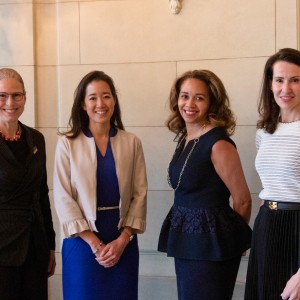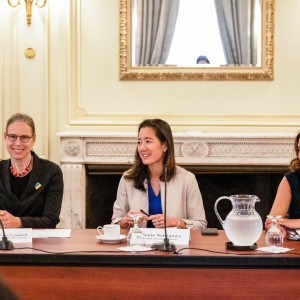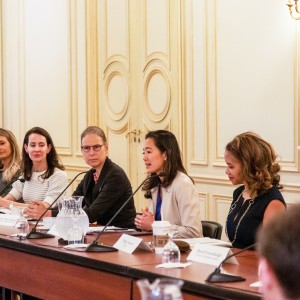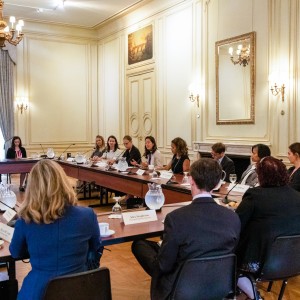Meridian Global Business Briefing with Melanie Nakagawa, Senior Director for Climate and Energy, National Security Council
On May 12, 2022, the Meridian Corporate Council partnered with Ecolab to host a roundtable convening with Melanie Nakagawa, Senior Director for Climate and Energy at the National Security Council, for a conversation on the future of U.S. climate and energy policies. The discussion was moderated by Meridian Center for Diplomatic Engagement Advisory Council member, Ambassador Piper Campbell, Professor at American University and CEO of Campbell Wind.
Below are the top takeaways from the conversation:
ESTABLISHING A STRONG DOMESTIC FOUNDATION
The challenges of today demand a new and broader understanding of national security to address the cross-cutting nature of many critical issues, including climate and energy. Melanie Nakagawa, Senior Director for Climate and Energy, stated that the National Security Council (NSC) recognizes the need to strengthen domestic leadership in the United States to build climate resilience and ensure climate justice. Rejoining the Paris Climate Agreement on January 20, 2021 was the Biden Administration’s first step to reestablish the U.S. as a climate leader and to accelerate the efforts necessary to tackle the climate crisis and raise global ambitions. Since then, a whole-of-government approach has been implemented to ensure that every cabinet member and department is focused on advancing clean energy.
WORKING ALONGSIDE INTERNATIONAL PARTNERS
Reestablishing the United States as a global climate leader is a core pillar to the domestic and foreign policy agenda for the Biden Administration. To accomplish this, Ms. Nakagawa emphasized the need to work alongside international partners to develop new rules to govern emerging technologies, including clean energy technologies critical to reducing carbon emissions and slowing climate change. The Quadrilateral Security Dialogue (Quad), in particular, is committed to advancing low-emissions technology solutions to support emissions reduction. As the Quad works together and with other countries to support, strengthen, and enhance actions globally, it is better situated to strengthen diplomatic efforts to form a universal agreement on climate change.
MAXIMIZING IMPACT WITH THE GLOBAL COMMUNITY
It is the global community’s job to listen, learn, and provide support to help strengthen economies and pass on healthy lands, waters, and wildlife for future generations. Private sector involvement is critical to assure that the government is allocating the proper financing for solutions. Initiatives like the “America the Beautiful” Initiative, as stated by Ms. Nakagawa, represents a call to action for the government, private sector, and local stakeholder to come together create jobs and strengthen the economy, while tackling climate and nature crises. Together, the private and public sector can develop better policies that will guarantee a cleaner and safer environment.
MOVING FROM COMMITMENT TO IMPLEMENTATION
The next United Nations climate change summit (COP27) in Egypt this November aims to focus discussions on implementation on the promises made at last year’s U.N. climate summit (COP26) in Glasgow, Scotland, including effectuating plans to cut carbon dioxide emissions by a minimum of 45% by 2030 and reach a pollution-neutral planet by mid-century. In an effort to reduce emissions, First Movers Coalition was launched during COP26 for companies to commit to buying zero-emission goods and services by 2030, to create demand for low-carbon technologies, make them cost-competitive, and build the clean supply chains of the future. To ensure that these plans are fulfilled, COP26 negotiators agreed that countries should step up their ambitions and report their progress every year rather than every five years, which Ms. Nakagawa believes will hold governments accountable and she fully expects to see conversations about further implementing these commitments at this year’s U.N. climate summit.
RISING PRICES CREATE CLIMATE CHALLENGES
In the past year, natural gas, coal's main competitor, has become more expensive. The Energy Information Administration predicts that Americans will use 4% more coal this year as a result of the rising natural gas prices. Ms. Nakagawa sees this as a growing concern because when coal is burned, it releases impurities that can combine with oxygen to form sulfur dioxide (SO2). When SO2 combines with moisture in the atmosphere, it produces acid rain that can harm forests and lakes. The Biden Administration recognizes this as a need to build up gas infrastructure, while ensuring that it is built in a way that is aligned with net zero in mind.
In partnership with

Project summary
| Meridian Global Business Briefing with Melanie Nakagawa, Senior Director for Climate and Energy, National Security Council | May 2022 | |
|---|---|
| Number of Attendees: | 30 |
| Impact Areas: | Business and Trade, Science and Technology, Energy and the Environment |
| Program Areas: | Diplomatic Engagement |
| Partners: | Private Sector |




